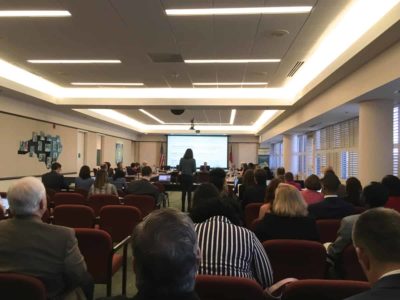The State Board of Education was slated to vote last week on recommendations that would make it easier for out-of-state teachers to be licensed in North Carolina, but Board members decided more review was necessary before they could make a decision.
The recommendations came from the Professional Educator Preparation and Standards Commission (PEPSC), which suggested North Carolina take the following steps:
- “Accept approved licensure exams from states who require such exams for out-of-state individuals applying for licensure in North Carolina.
- “Out-of-state individuals who are certified in a state without approved licensure exams are required to take the approved NC licensure exams.
- “Out-of-state individuals who are applying for an NC ECGC or Elementary Education teaching license must pass another state’s approved math and reading subtests to be eligible for a North Carolina Continuing Professional License.
- “Individuals can add a teaching area to an existing teaching license with two years of relevant work experience in the past five years.”
The stumbling blocks for State Board members are the exams and standards of other states when it comes to licensing teachers.
Board members wanted to know how the standards of other states compare to North Carolina and expressed concern that if they weren’t up to par, admitting out-of-state teachers could amount to lowering North Carolina’s standards for teachers.
Previously, North Carolina accepted teachers from other states who had passed their state’s licensure exam, but the requirements were more onerous. The exam the teacher took had to either be identical to North Carolina’s exam or the state Department of Public Instruction (DPI) had to determine that it was “comparable in content and rigor” to North Carolina’s. According to Tom Tomberlin, director of District Human Resources at DPI, the department didn’t have the “technical expertise to determine comparability,” so in reality, North Carolina only accepted out-of-state teachers who had already taken a test identical to North Carolina’s.
The new policy would simply allow licensed out-of-state applicants with three or more years of teaching experience in another state who have met that state’s testing requirements to start teaching in North Carolina. They could receive a Continuing Professional License (CPL), which is good for five years before renewal. If their state did not have a licensing exam, they would have to pass North Carolina’s.
If out-of-state teachers have fewer than three years experience, then they may be eligible for an Initial Professional License (IPL) if they have passed another state’s licensure exam for their licensure area. An IPL lasts three years before it must be converted into a CPL.
There are a few extra requirements for out-of-state elementary school teachers — both general education and exceptional children teachers with three or more years of experience. That’s because current state law requires that teachers in these areas also pass another state’s mathematics and reading subtests. Additionally, out-of-state exceptional children teachers must also pass another state’s Exceptional Children General Curriculum exam. If they have done these things, they will be granted a CPL.
If they haven’t completed those requirements, they can get an IPL and begin teaching provisionally, but they are required to either take the NC exams or take DPI’s Foundations of Reading and Mathematics courses and pass the course assessments before or in their second year of teaching.
For teachers in these subject areas who have fewer than three years experience, the same requirements apply, but they would only be granted an IPL. If they haven’t passed another state’s subtests, they would be left with the same two options: take the NC exams or enroll in the Foundations of Reading and Mathematics courses.
Right now, the new policy remains in limbo. This subject will return to PEPSC before likely coming back again before the State Board.



